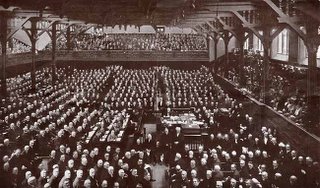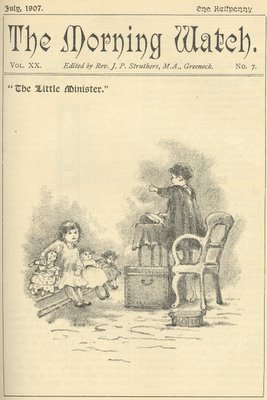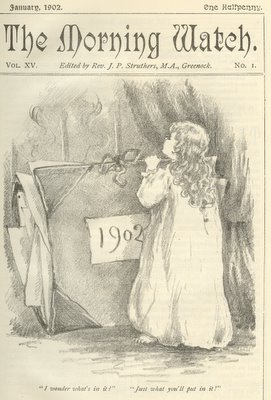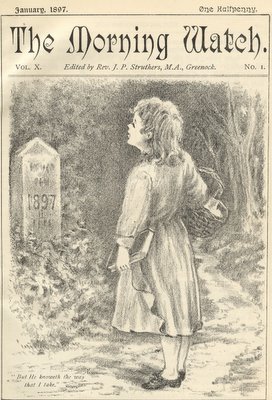"Rainy wi'oot the Principal" III.
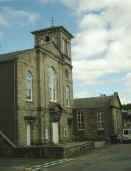
Robert Rainy was licenced to preach in 1849. He was called to take charge of a Free Church mission station in Renfrewshire soon after, and he served there for six months until the pious Free Church member, the Duchess of Gordon asked her to come north to Huntly in Aberdeenshire for a few weeks, partly to act as her chaplain, and partly to supply the pulpit of the Free Church of Huntly, which was currently vacant. Rainy accepted the offer, and he came to Huntly to preach.
The people and elders of the Free Church of Huntly (photo on left) were impressed by the young man's ability, and they extended a call to him to take up their pastorate. Rainy was surprised: Huntly was hardly an unimportant Church, and he was only a young man, his only experience had been as a missionary. But the Church told him that they felt he was capable, and after careful consideration, Rainy decided to accept the call. He explained in his letter accepting the call:
"I do so in fear and with some sense, though not in an adequate sense, of my unfitness for the work in Huntly. But if God grant me the prayers of the people to whom I am to minister, I will not despair. My dear sir, let us beseech God to rain down blessings upon us all, for surely we all greatly need them at his hand. Especially let us seek that He would put His spirit within us."
He was ordained on 22nd January, 1851. Rainy was in no doubt as to the importance of his position. Huntly is an important market town in the middle of Aberdeenshire, centre of a large upland district. What was more, Rainy knew that there were 'parties' among the people, one of which was a 'spiritual' party (perhaps like the 'Christ party' at Corinth) who regarded themselves as the true Church, while all others were of the world. "the opinion may be right or wrong," Rainy observed, "but it is an unsafe opinion for any one to hold in regard to his own case."
But Rainy was a wise and skilful young pastor. He set an example by his behaviour as well as from the pulpit. The people, on the whole, were considerate of the young pastor, and people and pastor grew to love each other. Rainy spent eleven hours on each sermon, and the effort was worth it, for a little girl in his congregation declared later that Rainy had a unique power of "making great things simple." His deep spiritual religion made a great impression on the critical Highland congregation, and he affected men by his prayers more than by his sermons, although he himself felt that his prayers were poor and lacking.
Huntly was the perfect place for the young man to begin his work. He would often go for long walks alone (the author can confirm that the walking around Huntly is excellent), even in deep snow.
But news of his ability and earnestness had spread, and in 1853 rumours began to be spread abroad that the Free High Church, Edinburgh, was considering extending a call to Rainy. At first Rainy felt that, even though William Cunningham was one of the main movers behind the call, it was his duty to remain longer at Huntly. Edinburgh, however, would not take no for an answer. Huntly implored him to stay, Cunningham was on the verge of practically forcing him to go to Edinburgh.
The call was placed before the presbytery on 12th April 1854, supported by William Cunningham, now Principal of New College. But Rainy declared his intention to remain in Huntly, and the call was declined. His loving congregation were relieved, but they reckoned without the Edinburgh presbytery, who carried an appeal all the way up to the General Assembly. By 170 to 36 the Assembly overturned the judgement of the presbytery, and Robert Rainy was called to the Free High Church, Edinburgh. Rainy acquiesced in the Assembly's judgement, and on 25th June 1854 he preached his farewell sermon at Huntly Free Church. He spoke powerfully, urging those who were not believers to "hear me for the last time". A few days later he left his manse to begin the journey to Edinburgh and the Free High Church.
And there we shall, God willing, meet him next time.
Labels: Principal Rainy
